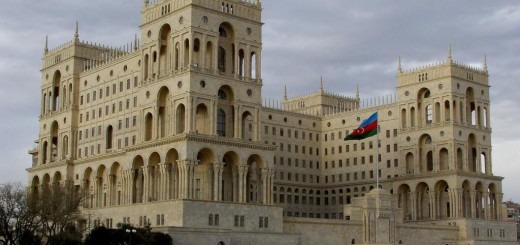How Not to Run a Government, And Get Dethroned by the People
The recent events in Armenia surprised and impressed both Armenians and non-Armenians worldwide because a leader thought to be irreplaceable by his supporters was replaced by a newcomer without any violence or bloodshed. Furthermore, what is taking place in Armenia is much more than unseating a particular leader. A regime entrenched for two decades was overthrown almost overnight!
To understand what took place in the last few weeks in Armenia we need to go back to 1991, the date of Armenia’s independence from the Soviet Union. Since then, Armenia has had three presidents, none who cared about the people and ruled the nation democratically. Power was concentrated in their hands as well as the military leadership and oligarchic clans.
While a handful of autocrats sat at the top of the pyramid of power, the overwhelming majority of the people were deprived of the basic necessities of survival, such as food, clothing, medicine, and of course, money. In the past quarter of a century, over a million Armenians left the homeland and resettled wherever they could find a job and feed their families. Many of those who could not leave barely survived on funds sent by relatives and friends overseas.
Under these pitiful circumstances, the anger and resentment of the population against the authorities, particularly the head of state, kept on rising. In addition to abject poverty, people suffered because of corruption, fraudulent elections, unfair courts, unemployment, censorship and periodic police brutality. While those who had the means to get a visa and purchase airline tickets emigrated from Armenia, the rest were forced to keep their mouth shut and put up with the difficult conditions.
Every now and then there were public protests either challenging fraudulent elections or unbearable living conditions, but the police were able to quell the unrest by beating and arresting the demonstrators. The most violent incident took place in March 2008 when 10 people were shot and killed for challenging the election of Pres. Serzh Sargsyan.
While Pres. Sargsyan and his predecessor, Pres. Robert Kocharyan, remained oblivious to the deplorable conditions of the public, their dissatisfaction, resentment and anger against the authorities kept growing. These heads of state, surrounded by aides who kept heaping praise on them and reassuring them that everything was marvelous in the country, remained unaware of the public’s miserable situation.
Over the past 27 years, during hundreds of hours I spent privately in meetings with the three successive Presidents of Armenia, I brought to their attention the various problems existing in the country, from corrupt aides and government ministers to unfair court judgments based on bribery, fraudulent elections, etc. These Presidents told me that they were hearing about these issues for the first time. Very few people had the courage to bring them to their attention.
I dared to tell Pres. Kocharyan to his face that Armenia’s population hated him. He disagreed with me, but I insisted, challenging him to stand one night in a street corner disguised in a hat and overcoat and ask passers by what they thought of the President. I warned him that he would hear very abusive comments.
I also recall telling Pres. Sargsyan on the eve of his first election not to ignore the common people and not to appear on TV at weddings of wealthy oligarchs and the ribbon-cutting of their businesses. I suggested that he make a surprise visit once a month to the home of a poor family without his aides and bodyguards, and inquire about the family’s employment, income, and health—to show that he cared about the poor people who were the majority of the country. Unfortunately, he did not once make such a visit.
I also told Pres. Sargsyan that he should appoint an independent group of advisers from wise and experienced individuals who were not government employees. They would be able to give him their honest advice without any fear of getting fired. Regrettably, this suggestion was also ignored.
To make matters worse, the public never forgot or forgave Pres. Sargsyan for the killing by the Police of 10 protesters in 2008—and with each fraudulent election and continuing economic misery, their frustration increased. When the constitution was being modified in 2015, Pres. Sargsyan reassured the people that he had no intention of staying in power in 2018 when his second term of presidency would be over. Most people did not believe him and suspected that he would remain in office, switching from the ceremonial President’s chair to become the all-powerful Prime Minister, under the new constitution. During a private meeting in 2016, I remember asking Pres. Sargsyan if he planned to go home at the end of his term, as he had promised. I was alarmed when he said that he would make a decision based on the results of the 2017 parliamentary elections.
Meanwhile, the overwhelming majority of the people, despite their suspicions, were counting the days and hours for the end of Pres. Sargsyan’s term in office. When the Republican Party’s majority in Parliament elected him to become the new Prime Minister last month, the citizens could no longer control their anger. Tens of thousands of people came out in the streets, led by opposition Parliament member Nikol Pashinyan to vent their frustration.
Fortunately, the massive outpouring of anger was kept in check by Pashinyan’s constant exhortation not to commit any violence and to respect the Police forces. A series of blunders by Prime Minister Sargsyan and his Republican Party members in Parliament followed, when Sargsyan met with Pashinyan and walked out after three minutes. In a few hours, despite his Parliamentary immunity, Pashinyan was arrested and kept in an undisclosed location by the Police, turning him into a greater hero. Due to escalating protests, Pashinyan was released from incarceration, and unexpectedly, Prime Minister Sargsyan announced his resignation, confessing: “I was wrong, Nikol was right.”
On May 1, the Parliament met to elect a new Prime Minister. After a lengthy deliberation, the Republican Party majority almost unanimously voted against Pashinyan’s candidacy. On May 2, the crowds blocked all major streets, highways, and paralyzed the trains, subways and the road to and from the Yerevan airport. The following day, the Republican Party officially announced that it will not block Pashinyan’s planned election on May 8 as Prime Minister. At the time of writing this column on May 7, barring any surprising developments, Pashinyan is expected to be elected Prime Minister by the Parliament.
Pashinyan’s election probably would not resolve Armenia’s multiple problems. In the following 15 days, he will select his Cabinet of Ministers and present his government’s agenda to the Parliament for approval. There will be then a lengthy debate on amending the election laws, followed by new Parliamentary elections in several months. Despite the transformation in leadership, Armenia will continue to suffer from blockades by Turkey and Azerbaijan and the military conflict involving Artsakh.
We have to wait and see whom Pashinyan will appoint to key ministerial posts as Foreign and Defense Ministers. What kind of compromises will be made between Pashinyan’s minority members and the Republican Party’s majority in the Parliament while changing the election laws? Only then new parliamentary elections will be held. Assuming the new elections will be fair and properly supervised by the new government, it remains to be seen if Pashinyan’s party and his supporting parties will gain the majority in Parliament. The good news is that all of these developments have been taking place in line with the constitution, under pressure from the newly-awakened Armenian public-at-large.
Finally, the most important issue now is that the thousands of newly empowered young people, who came out to the streets demanding a more democratic state with a great degree of enthusiasm and emotion, should not be disappointed. Armenia cannot afford to lose its youth which are the future of the country!
Everyone in Armenia and the Diaspora should do everything in their power to ensure stability, peace and prosperity in Armenia under its new leadership.







